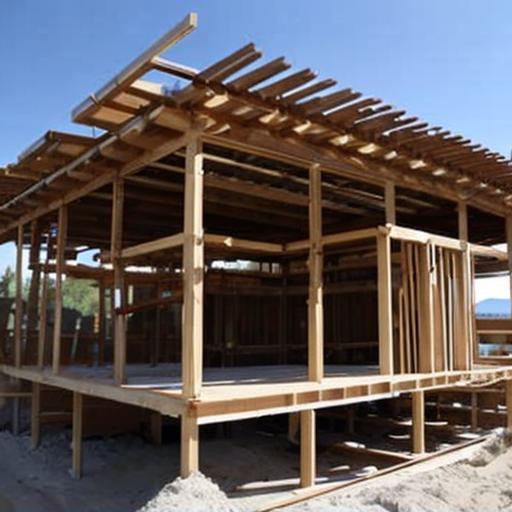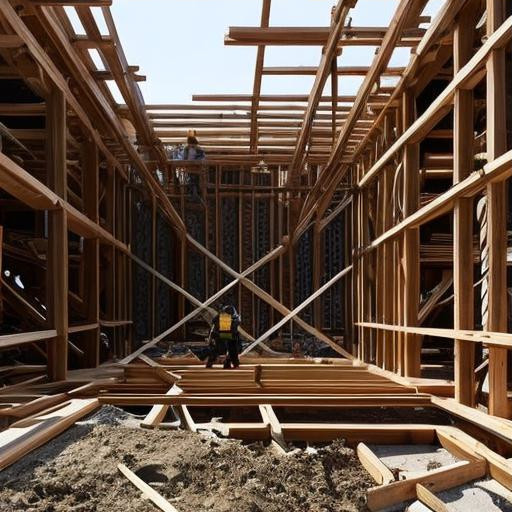

Framing contractors are professionals who specialize in the construction of the skeletal structure of buildings, including the walls, floors, and roofs. Their primary role is to frame the building, which involves creating the framework that serves as the structural support for the entire structure. Framing contractors are an essential part of the construction industry, and they work on both residential and commercial projects.
In contrast to framing contractors, other contractors in the construction industry focus on different aspects of the construction process. For example, general contractors oversee the entire construction process, including managing subcontractors, scheduling, and ensuring that the project is completed on time and within budget. Electrical contractors focus on the installation and maintenance of electrical systems, while plumbing contractors specialize in the installation and repair of plumbing systems. HVAC contractors focus on the installation and maintenance of heating, ventilation, and air conditioning systems.
Framing contractors play a critical role in the construction industry, as the skeletal structure of a building is essential to its stability and durability. They work closely with other professionals in the construction industry, including architects, general contractors, and subcontractors, to ensure that the project is completed according to the specifications and within the required timeframe.

Framing contractors work in both residential and commercial construction projects, although the frequency of their work in each sector can vary. In residential construction, framing contractors are typically involved in the construction of single-family homes, multi-family dwellings, and townhouses. In commercial construction, they may be involved in the construction of office buildings, warehouses, retail spaces, and other types of commercial structures.
Overall, the demand for framing contractors is higher in residential construction compared to commercial construction due to the high volume of single-family and multi-family home construction projects. However, in certain areas or during certain periods, there may be a higher demand for framing contractors in commercial construction due to increased construction activity in that sector.
Regardless of the sector, framing contractors play a critical role in the construction industry by ensuring the stability and durability of the skeletal structure of a building. They work closely with other professionals in the construction industry, including architects, general contractors, and subcontractors, to ensure that the project is completed to the required specifications and standards.
Framing contractors in the construction industry should consider several types of insurance to protect themselves and their businesses from potential risks and liabilities. Some of the key insurance policies that framing contractors may need include:
This type of insurance covers damages or injuries to third parties resulting from the contractor's work or negligence. General liability insurance may cover costs associated with property damage, bodily injury, and legal fees resulting from lawsuits against the contractor.
This type of insurance provides coverage for medical expenses and lost wages for employees who are injured on the job. Workers' compensation insurance is typically required by law in most states, and it can protect framing contractors from potential lawsuits related to workplace injuries.
This type of insurance covers the contractor's vehicles and drivers in the event of an accident. Commercial auto insurance may cover damages to the contractor's vehicle, injuries to third parties, and legal fees resulting from lawsuits against the contractor.
Also known as errors and omissions insurance, professional liability insurance provides coverage for damages or injuries resulting from the contractor's professional services or advice. This type of insurance may be particularly important for framing contractors who are involved in the design or engineering of a building, as mistakes or oversights could result in significant liability.
It is important for framing contractors to work with an experienced insurance agent who can help them identify the specific risks associated with their business and recommend appropriate insurance policies. By investing in the right insurance coverage, framing contractors can protect themselves, their employees, and their businesses from potential risks and liabilities in the construction industry.

General liability insurance is a type of insurance that covers a broad range of risks and liabilities that framing contractors may face in the construction industry. Here are a few examples of how general liability insurance can help framing contractors:
If a framing contractor accidentally damages a client's property, such as breaking a window or damaging a floor, their general liability insurance can cover the cost of the damage. This can include the cost of repairs or replacement of the damaged property.
If a client or a member of the public is injured as a result of the framing contractor's work, such as tripping over construction materials, the contractor's general liability insurance can cover the cost of medical expenses, lost wages, and legal fees resulting from a lawsuit against the contractor.
If a client discovers a defect in the framing contractor's work after the project is completed, such as a sagging roof or a wall that is not plumb, the general liability insurance can cover the cost of repairs or replacement of the defective work. This is known as completed operations coverage, and it can protect the framing contractor from potential lawsuits related to faulty workmanship or negligence.
If a framing contractor is accused of false advertising, copyright infringement, or other types of advertising injury, their general liability insurance can cover the cost of legal fees, settlements, and judgments resulting from a lawsuit against the contractor.
In summary, general liability insurance is an important form of insurance coverage for framing contractors in the construction industry. It can protect them from a wide range of risks and liabilities, including property damage, bodily injury, completed operations, and advertising injury.
Workers' compensation insurance is a type of insurance that provides coverage for medical expenses and lost wages for employees who are injured on the job. Here are a few examples of how workers' compensation insurance can help framing contractors:
If an employee of a framing contractor is injured on the job, such as falling from a ladder or being struck by a falling object, workers' compensation insurance can cover the cost of medical expenses, including hospitalization, surgery, and physical therapy. It can also cover the cost of lost wages while the employee is unable to work due to their injury.
If an employee of a framing contractor develops an occupational illness, such as respiratory problems due to exposure to sawdust or chemicals, workers' compensation insurance can cover the cost of medical expenses and lost wages resulting from the illness. It can also provide compensation for long-term disabilities or fatalities resulting from occupational illnesses.
Workers' compensation insurance can also provide legal protection for framing contractors who may face lawsuits related to workplace injuries. If an injured employee files a lawsuit against the framing contractor, workers' compensation insurance can cover the cost of legal fees, settlements, or judgments resulting from the lawsuit.
In summary, workers' compensation insurance is an important form of insurance coverage for framing contractors in the construction industry. It can protect them from potential lawsuits related to workplace injuries, and it can provide financial support for injured employees and their families.

Commercial auto insurance is a type of insurance that provides coverage for vehicles used for business purposes. Here are a few examples of how commercial auto insurance can help framing contractors:
If a framing contractor's vehicle is involved in an accident while being used for business purposes, such as transporting materials or equipment to a job site, commercial auto insurance can cover the cost of repairs or replacement of the vehicle, as well as any medical expenses resulting from injuries sustained in the accident.
If a framing contractor's vehicle is involved in an accident with an uninsured or underinsured motorist, commercial auto insurance can cover the cost of repairs or replacement of the vehicle, as well as any medical expenses resulting from injuries sustained in the accident.
If a framing contractor uses a rented or borrowed vehicle for business purposes, such as picking up supplies from a hardware store, commercial auto insurance can provide coverage for any damages or injuries resulting from an accident while using the non-owned vehicle.
If a framing contractor uses a vehicle to transport materials or equipment to job sites, commercial auto insurance can provide coverage for any damages or losses resulting from theft, vandalism, or other types of damage to the cargo being transported.
In summary, commercial auto insurance is an important form of insurance coverage for framing contractors in the construction industry. It can protect them from potential financial losses resulting from accidents or damage to vehicles and cargo used for business purposes.
Professional liability insurance, also known as errors and omissions insurance, is a type of insurance that provides coverage for professionals who provide services to clients. Here are a few examples of how professional liability insurance can help framing contractors:
If a framing contractor is responsible for the design of a building or structure, professional liability insurance can provide coverage for any errors or omissions in the design that result in damages or financial losses for the client.
If a framing contractor causes delays in a construction project, professional liability insurance can provide coverage for any financial losses or damages suffered by the client as a result of the delays.
If a framing contractor violates building codes or regulations, professional liability insurance can provide coverage for any financial losses or damages suffered by the client as a result of the violations.
If a framing contractor is accused of professional negligence, such as failing to adhere to industry standards or failing to meet client expectations, professional liability insurance can provide coverage for any financial losses or damages suffered by the client as a result of the negligence.
In summary, professional liability insurance is an important form of insurance coverage for framing contractors in the construction industry. It can protect them from potential financial losses resulting from errors or omissions in their work, as well as claims of professional negligence or violations of building codes and regulations.

Insurance limits and deductibles are important considerations for framing contractors in the construction industry. Here's a brief overview of each:
Insurance limits refer to the maximum amount that an insurance policy will pay out for a covered claim. For example, if a framing contractor has a general liability insurance policy with a $1 million limit and is sued for $1.5 million, the insurance policy will only pay out up to the policy limit of $1 million, leaving the contractor responsible for the remaining $500,000. It's important for framing contractors to carefully consider their insurance limits and ensure that they have adequate coverage to protect against potential losses or damages.
Deductibles refer to the amount that a policyholder is responsible for paying before their insurance coverage kicks in. For example, if a framing contractor has a general liability insurance policy with a $5,000 deductible and is sued for $100,000, the contractor will be responsible for paying the first $5,000, and the insurance policy will cover the remaining $95,000. It's important for framing contractors to carefully consider their deductibles and ensure that they can comfortably afford the deductible amount in the event of a covered claim.
Choosing appropriate insurance limits and deductibles can be a balancing act for framing contractors. On the one hand, higher insurance limits and lower deductibles provide greater protection against potential losses or damages, but they also come with higher premiums. On the other hand, lower insurance limits and higher deductibles may result in lower premiums, but they also expose the contractor to greater financial risk. It's important for framing contractors to carefully consider their insurance needs and budget when selecting insurance limits and deductibles, and to regularly review their policies to ensure that they have adequate coverage as their business grows and evolves.
In summary, insurance limits and deductibles are important considerations for framing contractors in the construction industry. It's important to carefully consider these factors when selecting insurance coverage to ensure that the contractor has adequate protection against potential losses or damages.
Framing contractors engage in a variety of tasks in the construction industry, some of which may be considered low-risk. Here are some examples of low-risk work that may not require purchasing insurance:
If a framing contractor is an employee of a larger construction company, the company's insurance policies may provide coverage for the contractor's work. In this case, the framing contractor may not need to purchase additional insurance coverage. However, it's important for the contractor to confirm with their employer that they are covered under the company's insurance policies and to understand the scope of the coverage.
If a framing contractor is performing minor repairs or maintenance work that does not involve major structural changes or alterations, the risk of damages or injuries may be relatively low. In this case, the contractor may not need to purchase insurance coverage, but it's still important to take precautions to prevent accidents or injuries on the job site.
If a framing contractor is working for a homeowner on a small-scale project, such as building a deck or a shed, the risk of damages or injuries may be relatively low. In this case, the contractor may not need to purchase insurance coverage, but it's still important to take precautions to prevent accidents or injuries on the job site.
In summary, there are some scenarios where a framing contractor may engage in low-risk work that does not require purchasing insurance. However, it's important for the contractor to carefully evaluate the level of risk involved in each project and to take precautions to prevent accidents or injuries on the job site.
State regulations regarding insurance requirements for framing contractors in the construction industry vary across the United States. Some states have specific insurance requirements for contractors, while others do not. Here are a few examples:
In California, framing contractors are required to carry workers' compensation insurance, as well as liability insurance with minimum limits of $1 million per occurrence and $2 million in the aggregate. Additionally, contractors must provide proof of insurance to the state's Contractors State License Board (CSLB) before they can obtain or renew their license.
In Florida, framing contractors are not required to carry general liability insurance, but they must carry workers' compensation insurance if they have one or more employees. Additionally, contractors may need to obtain other types of insurance, depending on the specific requirements of the project they are working on.
In Texas, framing contractors are not required to carry general liability insurance, but they must carry workers' compensation insurance if they have one or more employees. Additionally, contractors may need to obtain other types of insurance, depending on the specific requirements of the project they are working on.
It's important for framing contractors to check the specific insurance requirements in their state and ensure they are in compliance with all regulations. Failure to carry required insurance coverage can result in penalties or legal liabilities in case of accidents, injuries, or property damage on the job site.

Insurance policies for framing contractors in the construction industry typically include exclusions that may limit or exclude coverage for certain types of risks or incidents. Here are a few examples of exclusions to look out for in different types of insurance policies:
General Liability Insurance policies for framing contractors may have exclusions for certain types of damages or incidents, such as:
Workers' Compensation Insurance policies for framing contractors may have exclusions for certain types of injuries or claims, such as:
Commercial Auto Insurance policies for framing contractors may have exclusions for certain types of damages or incidents, such as:
Professional Liability Insurance policies for framing contractors may have exclusions for certain types of claims or damages, such as:
It's important for framing contractors to carefully review their insurance policies to understand the scope of coverage and any exclusions that may apply. Additionally, contractors should work with an insurance agent or broker who can help them select policies that provide adequate coverage for their specific business needs.
In summary, insurance policies for framing contractors in the construction industry may include exclusions that limit or exclude coverage for certain types of risks or incidents. For General Liability Insurance, exclusions can include intentional or criminal acts, pollution or environmental hazards, and claims arising from vehicle or aircraft use. Workers' Compensation Insurance may exclude injuries sustained while the employee was under the influence of drugs or alcohol, injuries resulting from willful misconduct or criminal activity, and injuries resulting from physical altercations not related to work. Commercial Auto Insurance may exclude damages caused by an unauthorized or intoxicated driver, or damages caused by the vehicle being used for personal or non-work-related purposes. Professional Liability Insurance may exclude claims arising from criminal or fraudulent acts, work performed outside the scope of coverage, or work performed by subcontractors or other third-party contractors not covered by the policy. Framing contractors should carefully review their policies and work with an insurance agent or broker to select policies that provide adequate coverage for their business needs.
Last Update: February 2023